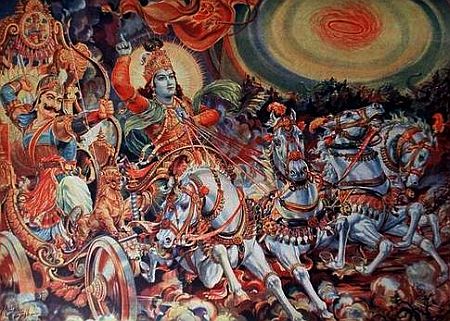Chapter 14: CONTENTS |
Chapter 14:
The Yoga of the Three Modes of Nature:
On the inherent qualities of material nature.Verses 5 to 10 & 16 to 20.
Text 5 The modes of goodness (sattva), passion (rajas) and ignorance (tamas) are the qualities produced by material nature which condition, o mighty armed one, this body of the imperishable living being.
Of them, is the mode of goodness the purest, it illumines without reactions, and conditions with a sense of happiness the feeling for knowledge, o sinless one.
Know that the mode of passion is characterized by desires, born from attachment and longing, that bind, o son of Kuntţ, the one embodied to the outcome of the deeds in the past.
The mode of ignorance is the result of lack of knowledge; know it as deluding all embodied beings, binding them to carelessness, indolence and [more than six hours of] sleep, o son of Bharata.
The mode of goodness conditions one to happiness, passion binds one to fruitive activities, o son of Bharata, but from the ignorance that covers the knowledge one is bound to errors.
Then goodness prevails defeating passion and ignorance, then o son of Bharata, ignorance does so with passion and goodness and then passion overrules goodness as well as the ignorance; this is how the modes of sattva, rajas and tamas are.
Of pious activities in the mode of goodness is said that one is purified, the mode of passion results in misery and stupidity is the result of the mode of ignorance.
The way from the mode of goodness knowledge develops and greed surely develops from the mode of passion, so do illusion and certainly perplexity develop from the mode of ignorance.
Those in the mode of goodness rise up, those in passion stay in between while the ones in ignorance whose occupation is of an abominable quality go down.
When a seer properly sees that the doer is no one other than these three qualities to the modes of nature and knows the beyond, he is promoted to My spiritual nature.
Transcending all three qualities the embodied one will enjoy the nectar of being freed from the physical result of the distress of birth, death and old age.'
Complete version of this chapter (14) in Sanskrit, word-for-word and translation
www.vahini.org: | Bhagavatha Vahini | Ramakatha Rasavahini | Other Vahinis | About Sai Baba | Links | Bhajans
![]()
![]()
![]()
![]()
![]()
![]()
